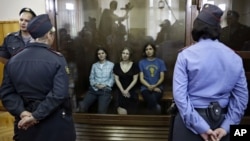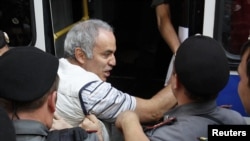MOSCOW — In the last six months, the brightly colored ski masks of Russia’s "Pussy Riot" protesters have become icons of Russia’s opposition movement. A Moscow judge handed down her verdict Friday in the case that brought the punk rock band world attention.
For this one minute of punk "prayer" in an Orthodox cathedral last February, the judge convicted three young women of hooliganism and gave each a jail sentence of two years.
The case split Russia and was seen as a test of President Vladimir Putin’s willingness to crackdown on his opponents.
About 70 percent of Russians describe themselves as orthodox Christians, and the church hierarchy maintains close ties with the Kremlin.
Last February, the three women - dressed in brightly colored tights, short skirts and balaclavas - entered a restricted area of Christ the Savior, the world’s largest Orthodox cathedral. They stepped out in front of the altar and danced and played guitars while praying for the Virgin Mary to drive out Putin.
Watch video of street scene outside the Pussy Riot trial in Moscow
Russian Orthodox churches ban musical instruments, dancing and masks. Women traditionally wear conservatively-cut clothes in somber colors or black.
Outside the courtroom today, Russian Orthodox faithful sang prayers.
Yovan explained why he had come.
"The decision of these women, 'Pussy Riot,' must be punished. They fight with all Russian culture. They fight with all Russian people," he said.
But most of the hundreds of people who came to the court Friday seemed to favor the women, who already have been held in jail for five months. During that time, the hostile public reaction that greeted their protest has turned to one of sympathy. Two of the three women have young children, whom they have not seen since March.
Katia, a 21-year-old, was one of many supporters. She said she does not believe the women are guilty. Her boyfriend, Alexei, said this was not a criminal trial, but a political trial.
Standing nearby, Viktor Zakharov, a businessman, criticized the judge’s guilty verdict.
"It shows to everybody that there is no fair court in Russia," said Zakharov.
Before Friday's court hearing, "Pussy Riot" supporters placed brightly colored balaclavas - woolen ski masks - on the heads of statues around Moscow.
After the guilty verdict was announced, police moved in aggressively to disperse the crowd of protesters outside the courthouse, and they detained several dozen people.
Sergei Udaltsov, a leftwing opposition leader, spoke to journalists there. He invited all to a protest rally on September 15 calling for the release of the "Pussy Riot" band and other “political prisoners.” Then he, too, was arrested.
The imprisoned singers have said they are encouraged by foreign support for them. In recent days, appeals for the women's release have come from Madonna, Sting and Paul McCartney.
As the Internet carried their cause around the globe, "Pussy Riot" supporters staged solidarity protests in places as diverse as London, Iceland, Vienna, Finland, Moldova and New York.
“It is a reputation disaster for Russia all over the world," said Zakharov.
Judge Marina Syrova said the three young women who comprise the "Pussy Riot" punk group had gravely offended Russian Orthodox sensibilities.
The public-relations setback for the Russian authorities may not be only abroad. According to a poll released Friday, Russians’ approval of Putin has sunk sharply since his inauguration three months ago.
In May, 60 percent of Russians polled by the Levada opinion-research group supported the president. By early August, his approval rating had fallen to 48 percent - the lowest level since he took office in 2000.
For this one minute of punk "prayer" in an Orthodox cathedral last February, the judge convicted three young women of hooliganism and gave each a jail sentence of two years.
The case split Russia and was seen as a test of President Vladimir Putin’s willingness to crackdown on his opponents.
About 70 percent of Russians describe themselves as orthodox Christians, and the church hierarchy maintains close ties with the Kremlin.
Last February, the three women - dressed in brightly colored tights, short skirts and balaclavas - entered a restricted area of Christ the Savior, the world’s largest Orthodox cathedral. They stepped out in front of the altar and danced and played guitars while praying for the Virgin Mary to drive out Putin.
Watch video of street scene outside the Pussy Riot trial in Moscow
Russian Orthodox churches ban musical instruments, dancing and masks. Women traditionally wear conservatively-cut clothes in somber colors or black.
Outside the courtroom today, Russian Orthodox faithful sang prayers.
Yovan explained why he had come.
"The decision of these women, 'Pussy Riot,' must be punished. They fight with all Russian culture. They fight with all Russian people," he said.
But most of the hundreds of people who came to the court Friday seemed to favor the women, who already have been held in jail for five months. During that time, the hostile public reaction that greeted their protest has turned to one of sympathy. Two of the three women have young children, whom they have not seen since March.
Katia, a 21-year-old, was one of many supporters. She said she does not believe the women are guilty. Her boyfriend, Alexei, said this was not a criminal trial, but a political trial.
Standing nearby, Viktor Zakharov, a businessman, criticized the judge’s guilty verdict.
"It shows to everybody that there is no fair court in Russia," said Zakharov.
Before Friday's court hearing, "Pussy Riot" supporters placed brightly colored balaclavas - woolen ski masks - on the heads of statues around Moscow.
After the guilty verdict was announced, police moved in aggressively to disperse the crowd of protesters outside the courthouse, and they detained several dozen people.
Sergei Udaltsov, a leftwing opposition leader, spoke to journalists there. He invited all to a protest rally on September 15 calling for the release of the "Pussy Riot" band and other “political prisoners.” Then he, too, was arrested.
The imprisoned singers have said they are encouraged by foreign support for them. In recent days, appeals for the women's release have come from Madonna, Sting and Paul McCartney.
As the Internet carried their cause around the globe, "Pussy Riot" supporters staged solidarity protests in places as diverse as London, Iceland, Vienna, Finland, Moldova and New York.
“It is a reputation disaster for Russia all over the world," said Zakharov.
Judge Marina Syrova said the three young women who comprise the "Pussy Riot" punk group had gravely offended Russian Orthodox sensibilities.
The public-relations setback for the Russian authorities may not be only abroad. According to a poll released Friday, Russians’ approval of Putin has sunk sharply since his inauguration three months ago.
In May, 60 percent of Russians polled by the Levada opinion-research group supported the president. By early August, his approval rating had fallen to 48 percent - the lowest level since he took office in 2000.





